A Hold That Won’t Let Go: Mental Health Impacts of Criminal Justice Contact
The story was co-published with Black Voice News as part of the the 2024 Ethnic Media Collaborative, Healing California.
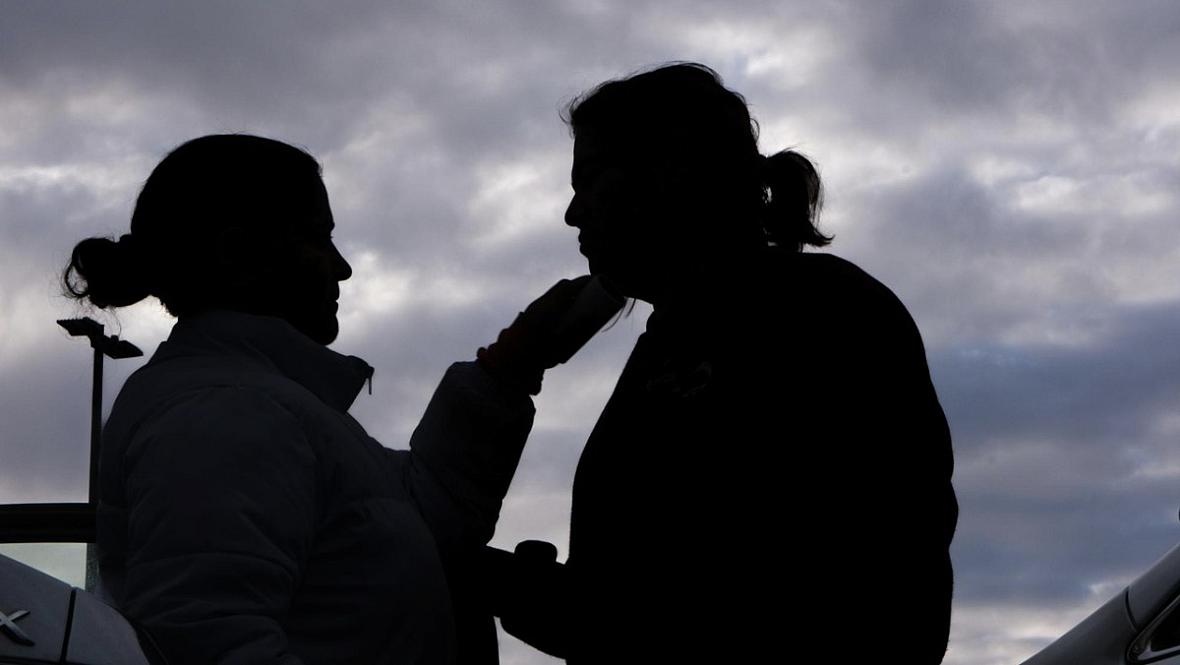
Driving down the 10 freeway east at 5 a.m. the sun would still sleep below the horizon for over an hour as Adam Garcia and his mother, Nena, traveled to his court hearing at the Larson Justice Center in Indio, CA, located in Riverside County’s Coachella Valley. Every month, they make sure to leave Los Angeles by 4 a.m. to account for traffic or car issues. Court starts at 8:30 a.m.
Adam has attended monthly court proceedings for over five years since being charged with being over the age of 21, and enticing a minor under 16-years-old to a location to engage in unlawful sexual intercourse. Adam maintains his innocence and states he does not know the victim. He was arrested three times – in Newport Beach in October 2018, in Studio City in March 2021, and in the City of San Fernando in April 2021.
In 2018, Adam was arrested under an initial arrest warrant issued by the Riverside County Sheriff’s Department, and was later released on bail. Two years later, while trying to gain access to an August 2020 court date, security claimed that Adam was exhibiting COVID-19 symptoms and denied him entry. Adam’s request to revoke the arrest warrant for being denied entry to the court was denied. This led to Adam having three arrests on his record as of Spring 2021— which Adam claims were illegal — leaving him traumatized.
Adam lives in constant fear of being targeted by the Riverside County District Attorney since he was surrounded by eight police officers and arrested at gunpoint in Newport Beach, CA, in 2018. This ongoing fear is why he requested to be photographed anonymously.
Adam says he is innocent.
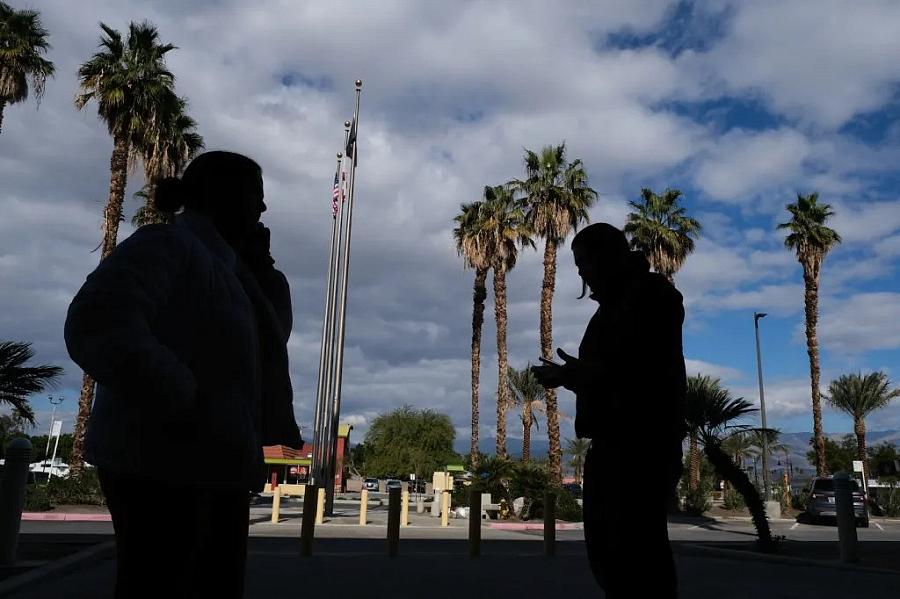
Nena and Adam use their phone to make calls to their family members after Adam’s court hearing in Indio on January 23, 2024. They say they can momentarily relax once court is over. Their drive is three hours each way and they often do not sleep the night before.
Aryana Noroozi for Black Voice News / CatchLight Local
This fear continued when Adam was rearrested in 2021 inside the private parking lot of his apartment building again at gunpoint, by an alleged fugitive recovery agent, who claimed to be a sheriff. The Ventura County Sheriff’s Office had no record of such a person, according to a public records request even though the recovery agent claimed to be a graduate of the Ventura County Sheriff’s Academy.
Since being arrested in Los Angeles County and transported to a detention center in Riverside, Adam and his mother, who witnessed his arrest, constantly fear being followed and arrested by plainclothes fugitive recovery agents claiming to be police officers.
Adam’s fear of being arrested isn’t uncommon. A 2023 analysis of arrests made by the Los Angeles Police Department between 2019 and 2022 demonstrates the disparate rate of Black and Latino people who are arrested. According to the analysis of police data by Los Angeles City Controller Kenneth Mejia, Black people account for 8% of the county’s population, but accounted for 27% of all arrests. Latinos, who makeup 48% of the county, accounted for 51% of all arrests.
In a research article on how criminal justice contact structures inequality, the authors, Kristin Turney and Sara Wakefield, note that several forms of criminal justice contact can result in life-altering changes and are important to understanding “the creation and maintenance of inequality.” They reference the murder of Philando Castile, who, prior to being shot by the police, had been pulled over dozens of times over the course of several years for minor traffic violations.
“One uneventful police stop or citation on its own might be considered inconsequential. Some might also be tempted to consider even many police stops less consequential if they never lead to deeper contact within the system. But how many is too many and what are the consequences for inequality?” the authors questioned.
Shortly after Adam’s second arrest, the family vacated their Studio City apartment due to mold infestation, leaving Adam’s paintings which lined every wall. They moved into a family member’s nearby home where Nena encouraged Adam to stay inside for months. Adam wanted to retrieve his items but Nena was fearful to return due to Adam being followed and arrested at their former home.
“When we’re thinking about why arrest would be a mental health stressor, it’s both the physical experience and emotional experience of arrest,” said Naomi Sugie, University of California, Irvine (UCI) professor of Criminology, Law and Society, in an interview with Black Voice News.
“Arrest can also entail what we refer to as anticipatory stress,” which Sugie explained involves uncertainty about what will happen as a result of the arrest.
“When you look at security cameras, when you look at random people… imagine walking around the mall, thinking that somebody is possibly following you, or that they might reverse the bail [just] while you’re [out] walking or going to eat a good meal,” Adam remarked about his life now.
Before 2018, Adam used to wake up and head to the gym. He said he used to live in a nice neighborhood and drive a nice car. He enjoyed going dancing with friends, DJing and painting. As a coffee lover, he aspired to open his own coffee shop. Adam’s passion, above all, was producing music. From 2006 to 2007, he studied audio engineering at the Los Angeles Musicians Institute.
“It feels like life is over,” he said. “Because at one point, I had a very good life.”
A waiting game
Now, Adam wakes up fearful everyday. He is never without a member of his family, even to the point of informing them when he uses the restroom in public places like malls. Adam’s days are filled with studying the law and writing motions to have the case dismissed.
Throughout Adam’s interactions with the criminal justice system, he has encountered difficult and unprecedented challenges. Attorneys assigned to him from both the public defender’s office and the conflicts panel both declared conflicts of interest throughout his case.
A conflicts panel consists of a group of private attorneys who are appointed to cases when the public defender’s office declares a conflict of interest. Adam has kept a list of the attorneys that have represented him at some point in the last five years. The list includes public defenders, conflict panel attorneys and private attorneys.
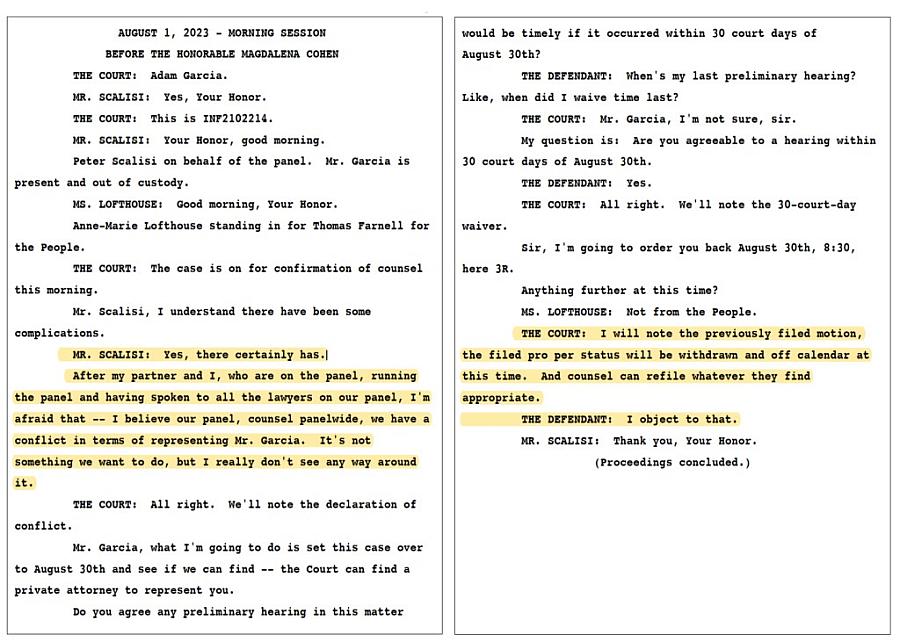
Transcripts from court on August 1, 2023 reflect that Peter Scalisi, head of the Desert Conflict Panel, declared “panel-wide”conflict of interest in representing Adam. Adam has filed “pro per,” which means he would act as his own attorney.
Courtesy of Adam Garcia
Adam has been studying the criminal justice system and has had to navigate the intricacies of the law, all while facing the possibility of imprisonment.
Currently, Adam is waiting to meet his new conflicts panel appointed attorney, whom he believes he should not be working with because of the panel’s previous declaration of conflict. At the crux of these changes lies the impact of his ongoing interactions with the criminal justice system on his mental health.
“I feel discriminated against. I feel poor,” Adam said, explaining how his case has ruined his self-esteem.
“Why would anybody want to be my friend now? Look what’s on my record. I feel like nobody would want to give me a chance.”
Nena said she feels like a gun is to her head.
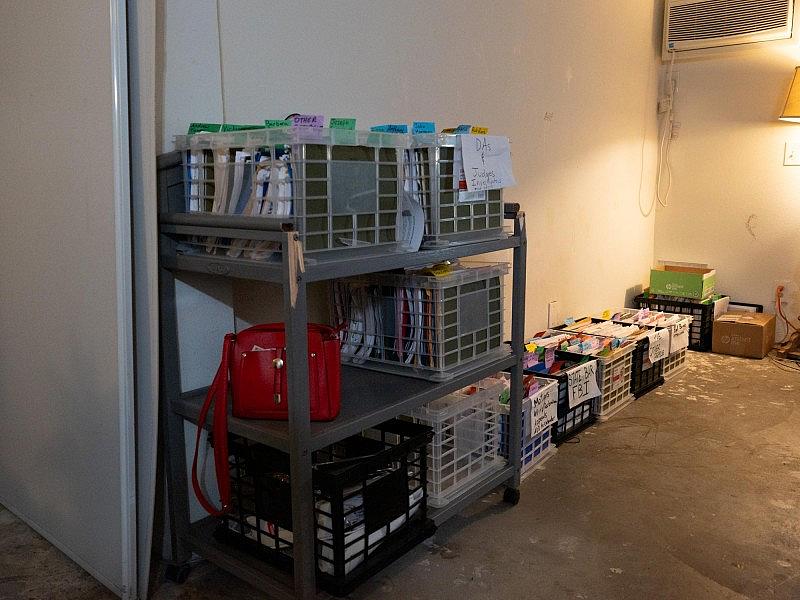
Documents that Adam utilizes to fight his case line the floor of their former apartment in the San Fernando Valley on September 21, 2022. Since moving out due to mold infestation, Nena, Adam, his father and younger brother have stayed with family members for nearly six months. Fighting the case consumes their time and financial resources, and has taken a toll on the entire family.
Aryana Noroozi for Black Voice News / CatchLight Local
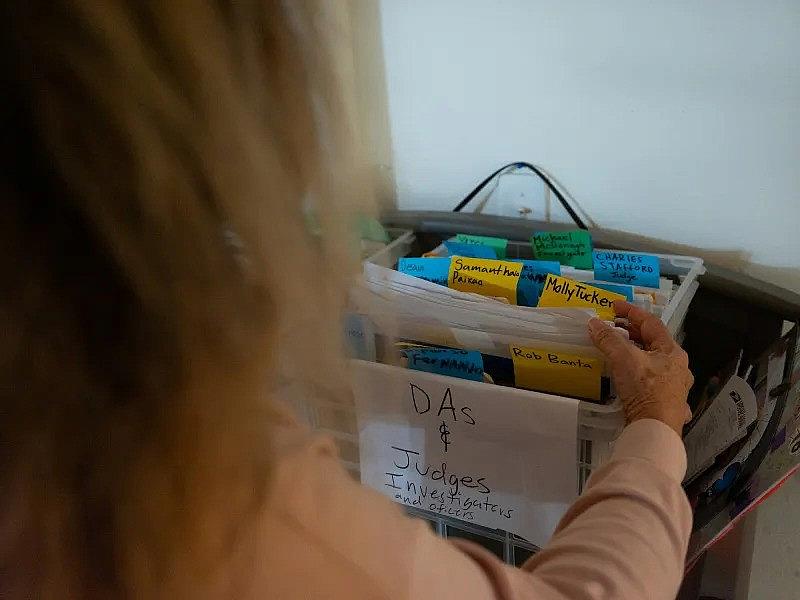
Nena looks through the files they have on the district attorneys, judges, investigators and officers that have been involved with Adam’s case on September 21, 2022. According to Adam, he has never been presented with the full discovery in the case.
Aryana Noroozi for Black Voice News / CatchLight Local
“They’re just waiting to pull the f—— trigger on us, and everyday [we are] trying to find a way for us to dodge that gun,” Nena expressed.
Nena is a real estate broker and mortgage broker, but the burden of Adam’s case prevents her from working. “Sometimes buying a home is going to take somebody six months. How can I spend six months trying to show properties when my son’s life is going down the drain?” Nena asked. Adam lives with his younger brother, mother and father. His case has impacted all of their lives.
Tangible impacts of criminal justice contact
Incarceration is just one facet of the criminal justice system that impacts a person’s mental health. According to a research study by UCI professors Sugie and Kristin Turney, other forms of criminal justice contact have lasting effects on a person’s mental health.
Their study, “Beyond Incarceration: Criminal Justice Contact and Mental Health,” examines the factors that influence how stress is perceived, responded to and managed.
The study “suggests that three forms of criminal justice contact — arrest, conviction, and incarceration, all concentrated among individuals in disadvantaged status positions — are salient stressors that impair mental health.”
Adam Garcia and his mother fall into the category of people who have made criminal justice contact as a result of his arrests and ongoing court proceedings. Coupled with their identities as Mexican Americans and current socioeconomic challenges they are in a disadvantaged position, according to the study.
Vonya Quarles, attorney and co-founder of Starting Over, Inc., a non profit organization that employs a holistic approach to reentry, explained that Black and brown people are overrepresented within the criminal justice system and disproportionately face its impacts, including changes to their psychological well-being.
“People go in without mental illness, or at least it just hasn’t surfaced yet. [They have] no history of a mental health condition. But you go through a process that doesn’t hear your innocence. It ignores your innocence, and focuses on prosecution,” Quarles said. “It can drive you to a different place. Mentally, it can break you. I’ve seen people get broken.”
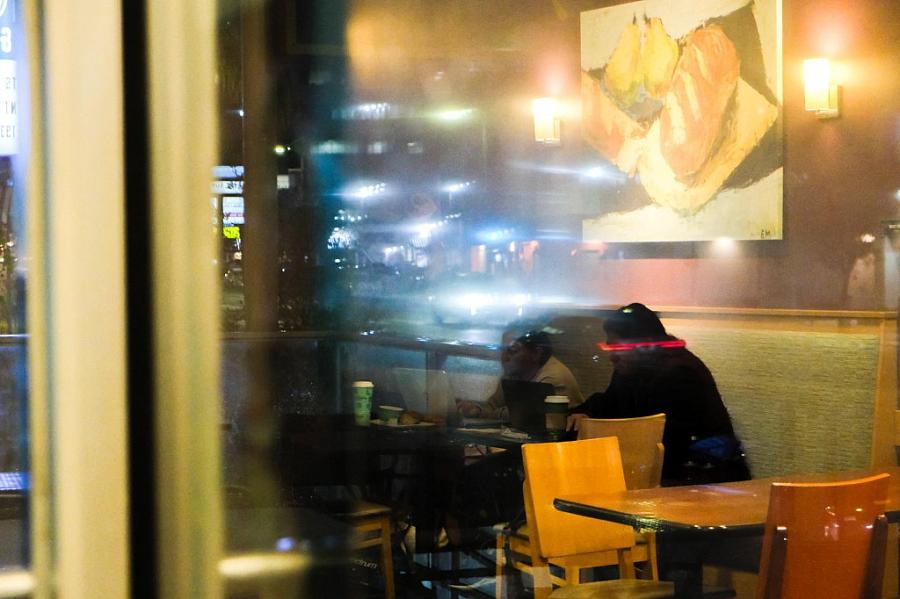
Adam works on preparing a motion the night before his court date on January 22, 2024 at a cafe in Los Angeles. On average, he spends six to 12 hours each day preparing legal documents and motions.
Aryana Noroozi for Black Voice News / CatchLight Local
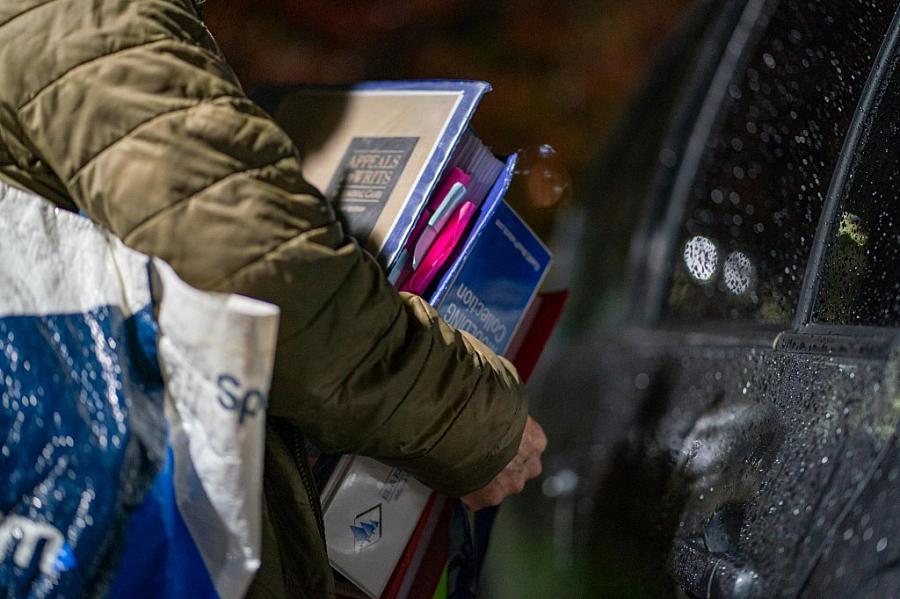
Nena carries binders full of legal documents and books to her car on January 22, 2024 after working all day at a cafe to prepare for Adam’s court case the following morning. During court, she noted the fatigue and exhaustion that she felt from the preparation.
Aryana Noroozi for Black Voice News / CatchLight Local
Much data and research exists detailing how incarceration affects a person’s mental health, however, there are few studies that examine the impact of the mental health of people who encounter different levels of the criminal justice system, like Adam.
In their research, Sugie and Turney found that “the consequences of criminal justice contact for mental health have a far greater reach than previously considered.”
In examining the link between criminal justice contact and mental health, the authors use a framework to examine the connection by acknowledging how being arrested can be a stressor that gives way to other stressors, such as feelings of powerlessness, uncertainty, stigma and police contact. All of these stressors may directly increase mental health problems.
“Anticipatory stress can really have an impact not only on the incarcerated person, but on their family members because they are also anticipating the uncertainty around what happens after this arrest,” said Sugie.
Adam’s mother is always sure a family member is with Adam whenever he talks to anyone about his case to act as a witness.
“Why? Because they have traumatized us,” Nena said.
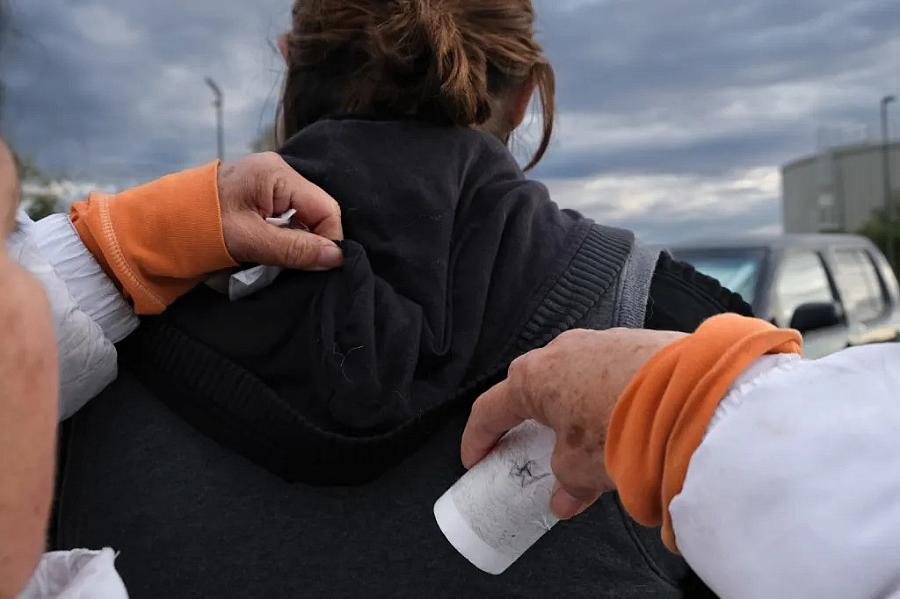
Nena removes dog fur from Adam’s clothing before they enter the Larson Justice Center for his court hearing on January 23, 2024.
Aryana Noroozi for Black Voice News / CatchLight Local
“They took away my thirties”
Adam was 33 when he was first arrested. “I’m 39 and they took away my thirties.”
Today, his mind is occupied by the various potential dangers of his current situation. If found guilty of the charges, Adam said he could face up to eight years in prison. Each court date contributes to Adam and Nena’s anxiety as they run through possible outcomes.
“Everytime you go to court, you’re probably thinking, ‘Hey, this judge can take away my bail if the judge wants to.’ You never feel safe. You never feel secure when you’re going through that process,” said Monica Nguyen, a Riverside County deputy public defender.
As a member of the mental health court team, Nguyen’s specialty is mental health and competency to stand trial.
“You have to understand that feeling safe and secure is so fundamental to exist as a healthy person,” Nguyen said.
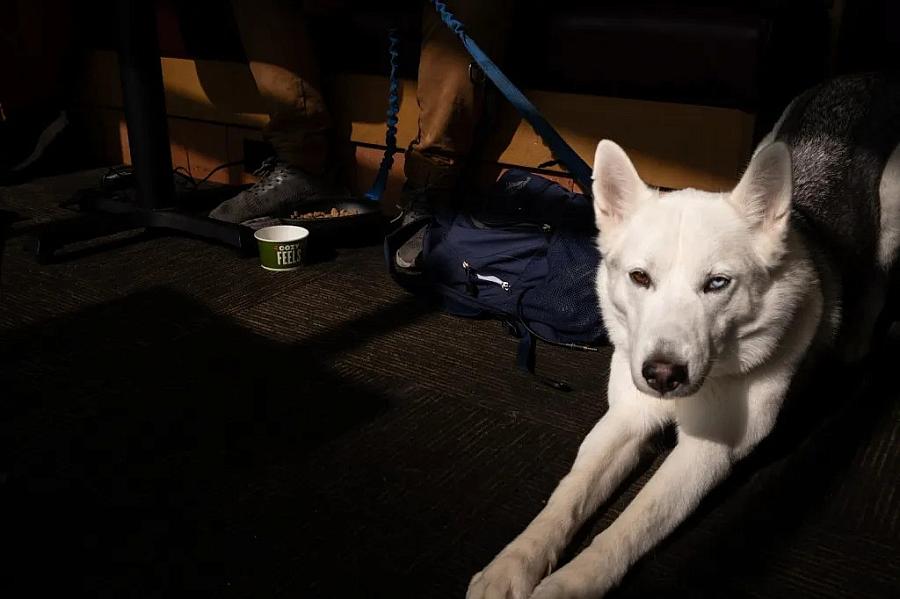
Adam’s dog Blue sits beside him under a table at the cafe where Adam writes a motion on February 8, 2024. He and Nena will often stay at the cafe from open to close working on his case.
Aryana Noroozi for Black Voice News / CatchLight Local
For Adam, one of the biggest impacts on him is the isolation and “not having anyone to talk to about his case.”
He described recently disclosing his situation to a new friend, “which was very therapeutic for me,” he said.
But this conversation hasn’t always been easy.
“I told two people that I tried to be friends with – I told them that I’m being prosecuted. One of them took it well, the other one doesn’t talk to me anymore,” he said.
His extended family has lent Adam and Nena money to fight the case. But as the years passed, he has fielded questions about when it will end.
One of Adam’s public defenders, Joseph Cavanaugh, even asked him why he doesn’t just take the three year deal he was offered.
Stressors Beyond the System
“Stress proliferation is this idea that one stressor like arrest can then lead to these other stressors, like losing a job, or having problems in your relationships,” said Sugie. “All of those things sort of accumulate and take a real toll on your health and your mental health.”
The combined stress of trying to generate sufficient income, not overdraft their bank accounts, pay for gas, afford notary and document fees weighs heavily on the Garcia family.
Adam relies on the small income other family members generate from working as food delivery couriers throughout the day, picking up and delivering food from restaurants to customers across Los Angeles. The flexible hours are ideal since most of the family’s time is dedicated to working on the case, supporting Adam as he writes motions and studies legal processes.
On average, Adam spends six to 12 hours each day preparing legal documents and motions, always accompanied by Nena.
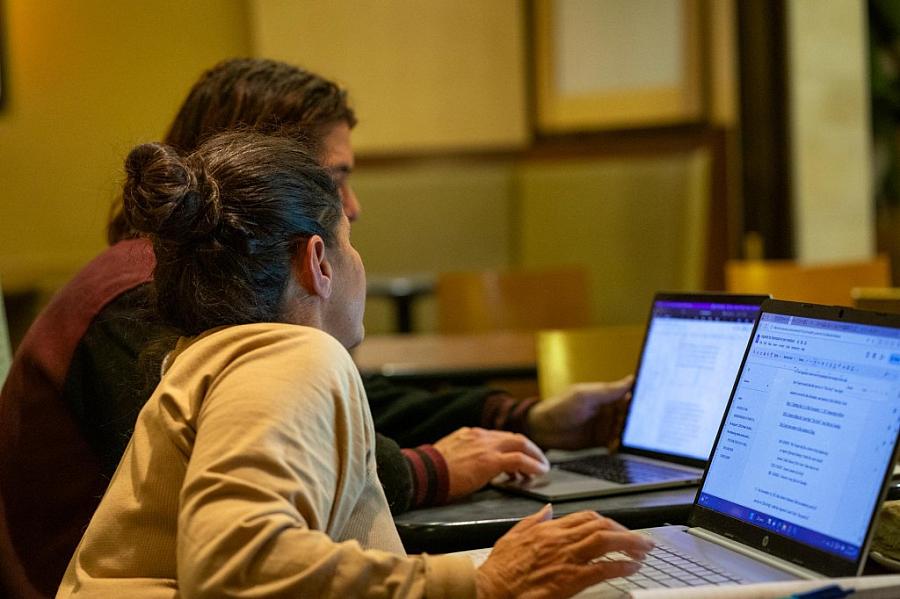
Nena looks over to Adam’s screen as he prepares a motion to be heard the following day at his court hearing on January 22, 2024.
Aryana Noroozi for Black Voice News / CatchLight Local
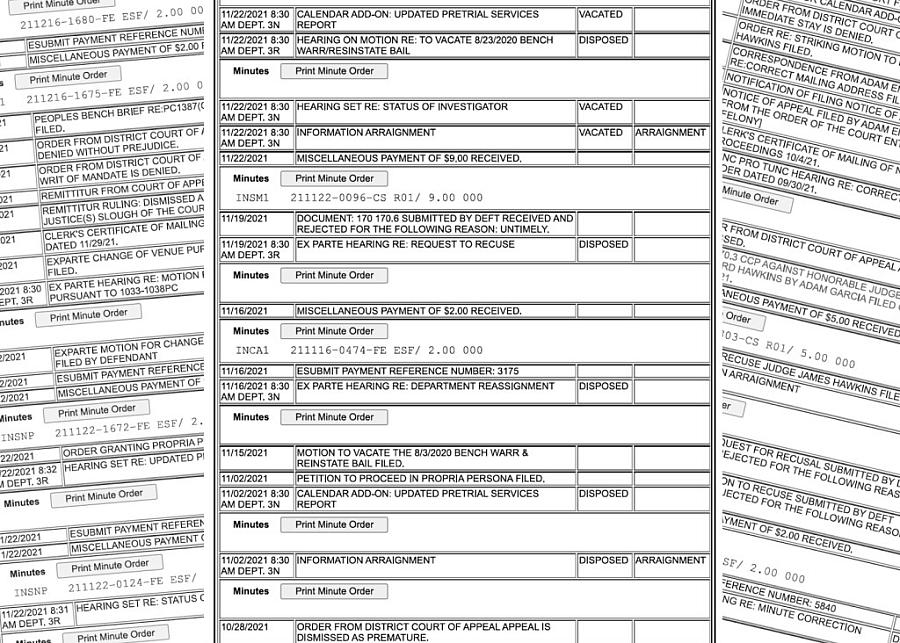
A collection of Adam’s minute orders show some of the dozens of motions he has filed over the course of five years, as detailed in 19 pages of documents.
Riverside Superior Court Public Access
“Even to file the motion, they charge $2. Sometimes we don’t even have $2. It’s so little, but sometimes on a credit card [there] isn’t even that.”
Adam said anticipating his next court date is nearly impossible and anxiety-inducing. The unpredictability makes it hard for either of them to be tethered to any obligations outside of the case.
Some days he is told to return within a week to continue proceedings that were supposed to be previously addressed. Days like that fuels Adams anxiety, considering he travels three hours each way — a total of six hours — to and from court. Oftentimes, they are worried if their car will make the drive without popping a tire and at times, have relied on transportation from others.
“Just getting to court becomes a task or a chore,” said Quarles. “Transportation is another barrier, especially here in the inland region. [So is] remembering the court date and remembering it correctly.”
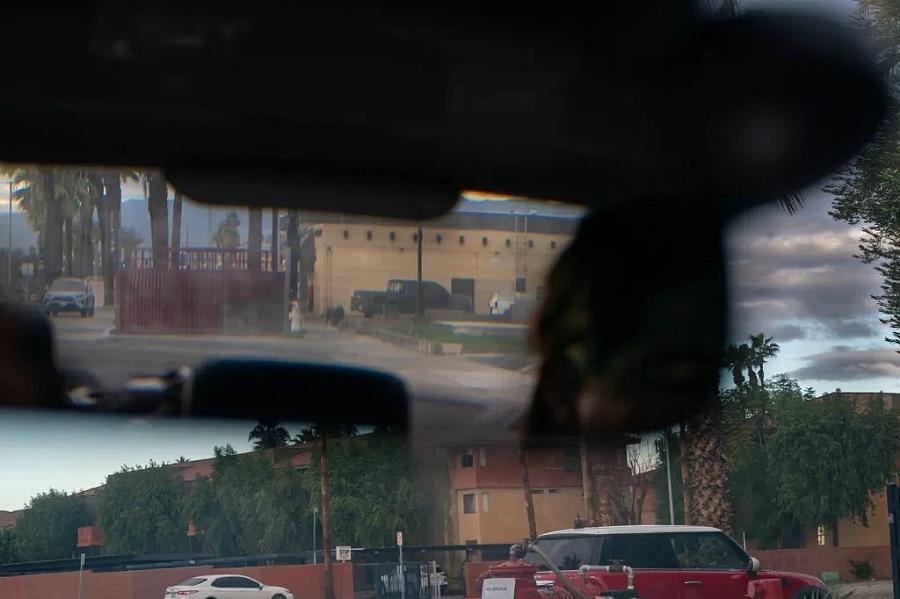
Adam sits in the car shortly after sunrise, minutes before for his court hearing in Indio on January 23, 2024.
Aryana Noroozi for Black Voice News / CatchLight Local
Even when Adam and Nena leave the courtroom, the stress of preparing for another court appearance follows them home.
“I wake up as early as possible, so we can squeeze in as much things that we can because there’s so much to do… to be ready for his next court date,” Nena said. “I always feel like I’m running out of time.”
In previous years, they hired private attorneys to defend Adam. Now, with their resources depleted, it is nearly impossible for Adam to secure a private attorney, so the cycle continues.
Adam and Nena were unable to secure a new apartment when they were forced to relocate due to a mold infestation. The ongoing stress of their case, combined with their sudden move, has left them without a permanent residence. They have been staying in their extended family members’ homes. Adam’s younger brother has been financially supporting the family.

Adam points to a Bible verse that brings him comfort on September 22, 2023. Adam has leaned on faith throughout his case.
Aryana Noroozi for CatchLight Local / Black Voice News
Adam has not sought psychological treatment.
“I feel like I don’t have time. Because either I go to the psychologist, and he’ll waste two hours or three hours of my day when I can be researching and reading or writing the next thing for court,” he said.
Adam is unsure if he’ll ever seek treatment, even when his case is over. Adam isn’t alone. According to the National Alliance on Mental Illness (NAMI), many communities of color do not seek treatment for their mental health due to stigma, cultural differences and a lack of cultural competence among providers.
“I don’t know if I believe in therapy,” he said, adding that he has not seen anyone that attended treatment sessions and overcame what they needed to.
Nena said she is a strong believer in jogging everyday, going on a hike or walk on the beach, taking pictures and spending time with friends.
“That’s probably, to me, more therapeutic than talking to another person that probably is more messed up than you are and trying to fix you,” she said.
However, even if the Garcias decide to seek mental health resources, finding services in their current situation could be difficult, according to Nguyen. Treatment programs are often accessible to people much later, such as within prison or in reentry programs.
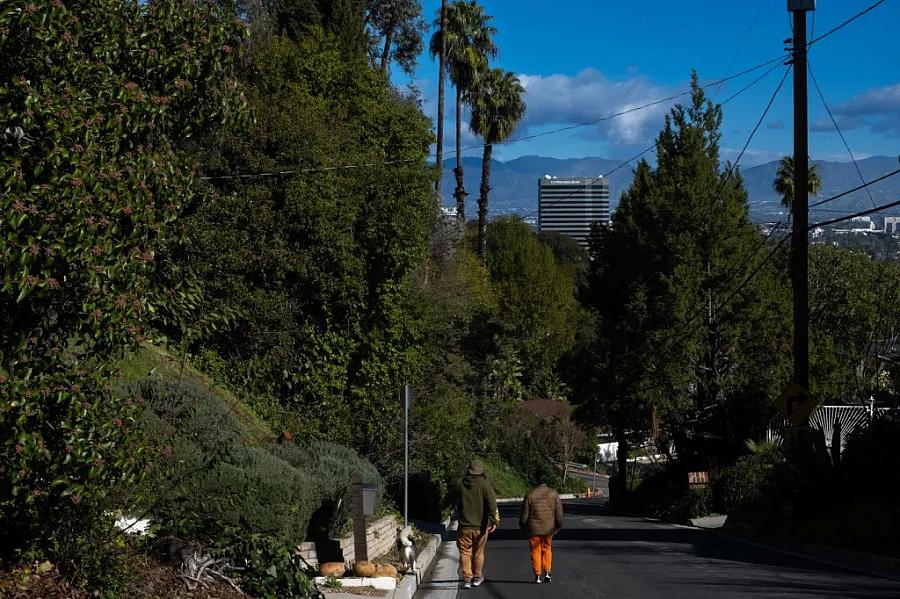
Adam and Nena walk their dog in Studio City in the morning before they begin working on Adam’s case for the remainder of the day on February 9, 2024. They both say exercise helps them cope with the mental toll of their interaction with the criminal justice system.
Aryana Noroozi for CatchLight Local / Black Voice News
“We do have treatment programs, but not to assist the average person who needs the treatment to assist them with just getting through the criminal justice system,” she said.
Public mental health treatment is offered through Riverside University Health Systems, but those services are “separate and distinct from court processes,” Nguyen said. She added that these systems are often already overburdened.
“Although a large literature considers the health consequences of incarceration, it is not the most frequent type of contact, nor is it necessarily the most consequential or long-lasting form of interaction,” Sugie and Turner wrote in their study.
Adam is one of thousands of residents across Southern California’s Inland Empire who has made contact with the criminal justice system. Although he has not been convicted nor incarcerated, —but jailed each time he was arrested – the ongoing court proceedings, fear of police and his inability to create a stable life for his family has left a heavy imprint on his mental health.
This Black Voice News project is supported by the USC Annenberg Center for Health Journalism, and is part of “Healing California,” a yearlong Ethnic Media Collaborative reporting venture with print, online and broadcast outlets across California.
